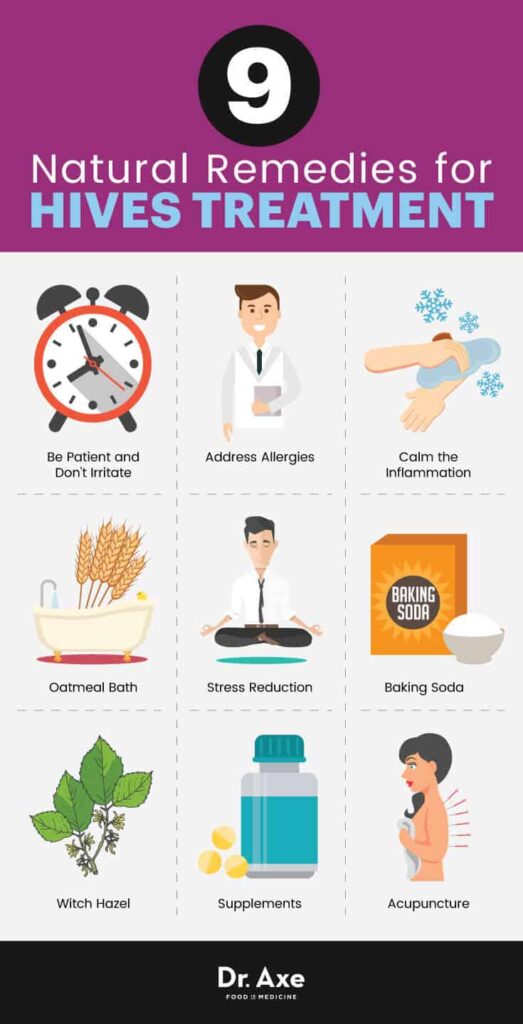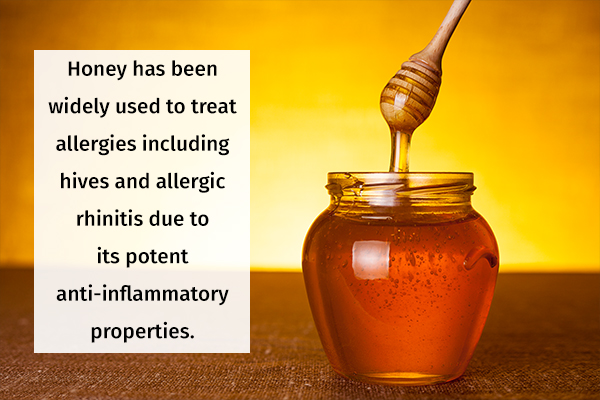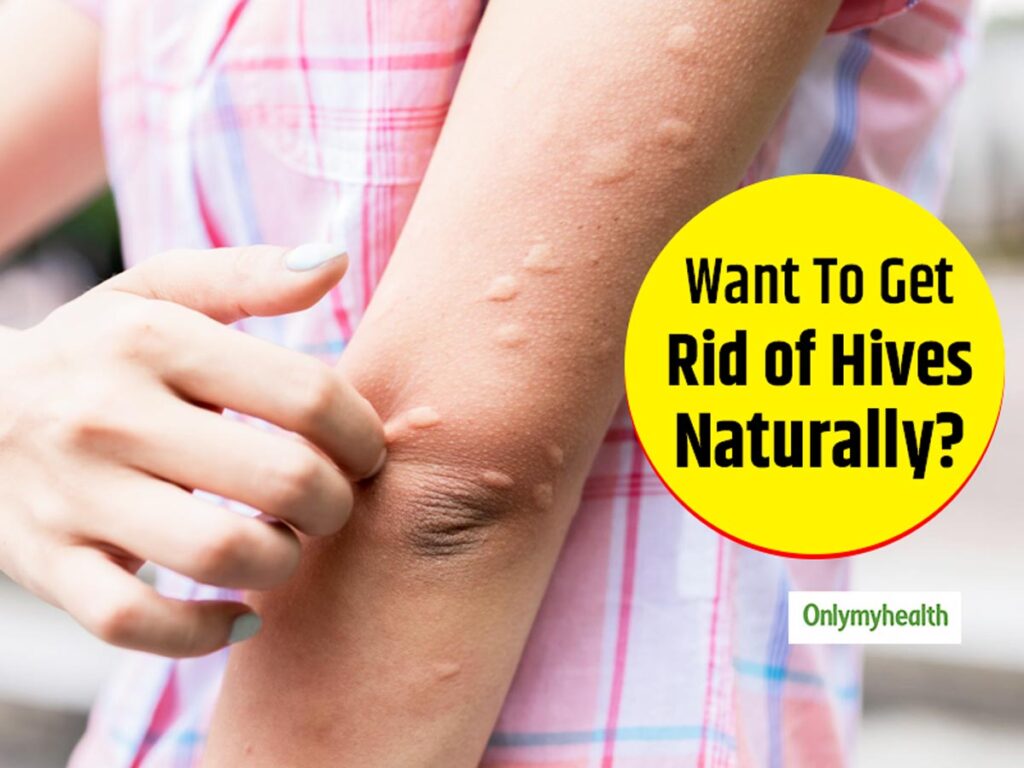If you’re tired of dealing with the discomfort and itchiness that comes with urticaria (also known as hives), then it’s time to discover the power of natural remedies. In this article, you will explore a range of effective solutions that can provide relief without relying on harsh chemicals or medications. From soothing aloe vera gel to calming oatmeal baths, these natural remedies can be easily incorporated into your daily routine to help alleviate symptoms and promote a healthier, happier you. Say goodbye to the frustration of urticaria and hello to a more natural approach to healing!

What is Urticaria?
Urticaria, commonly known as hives, is a skin condition characterized by the sudden appearance of raised, red, and itchy welts on the skin. These welts, also known as wheals, can vary in size and shape and often appear in clusters. Urticaria occurs when the body releases histamine, a chemical that causes blood vessels to leak and results in the characteristic swelling and itching. It can be acute or chronic, with acute urticaria lasting less than six weeks and chronic urticaria lasting longer than six weeks.
Causes of Urticaria
Urticaria can be triggered by a variety of factors, including:
- Allergies: Certain foods, medications, insect bites or stings, and pollen can trigger allergic reactions and lead to the development of urticaria.
- Infections: Viral or bacterial infections, such as the common cold or urinary tract infections, can cause urticaria.
- Physical triggers: Exposure to extreme temperatures, pressure on the skin, or sweating can provoke urticaria.
- Stress: Emotional stress or anxiety can sometimes trigger the release of histamine and result in urticaria.
- Autoimmune disorders: Some autoimmune disorders, such as lupus or thyroid diseases, can also be associated with urticaria.
It is important to identify and address the underlying cause of urticaria in order to effectively manage the condition.

Symptoms of Urticaria
The main symptom of urticaria is the development of raised, itchy welts on the skin. These welts may appear pink or red and can vary in size, shape, and distribution. They may come and go, moving around the body or staying in one area for a period of time. Along with the welts, individuals with urticaria may experience:
- Itching: The skin affected by the hives may feel intensely itchy, leading to scratching and potential skin damage.
- Swelling: In some cases, the welts may be accompanied by swelling of the lips, tongue, throat, or other parts of the body.
- Burning or stinging sensation: The affected areas of the skin may feel tender or painful, in addition to the itching.
It is important to note that urticaria can vary in severity and duration, with some individuals experiencing mild, short-lived episodes, while others may have more severe and persistent symptoms.
Types of Urticaria
There are several types of urticaria, each with its own distinct characteristics:
- Acute Urticaria: This is the most common form of urticaria and typically lasts for a few hours to several weeks. It is often triggered by allergies, such as certain foods, medications, or insect bites.
- Chronic Urticaria: Chronic urticaria refers to hives that persist for longer than six weeks. The exact cause is often difficult to determine, but it may be related to autoimmune disorders, underlying infections, or environmental factors.
- Physical Urticaria: Physical urticaria is triggered by physical stimuli, such as pressure on the skin, exposure to cold or heat, exercise, or vibration. The welts typically appear within minutes of the stimulus and fade within an hour.
- Dermographism: This type of urticaria is characterized by welts that form when the skin is scratched or rubbed. The welts tend to appear quickly and may take on the shape of the object or pressure applied to the skin.
It is important to consult with a healthcare professional for a proper diagnosis and to determine the appropriate treatment plan for your specific type of urticaria.

Traditional Treatment for Urticaria
Traditionally, treatment for urticaria involves managing the symptoms and underlying causes. Some commonly prescribed medications include:
Antihistamines
Antihistamines are often the first-line treatment for urticaria. They work by blocking the effects of histamine, reducing itching, redness, and swelling. There are both over-the-counter and prescription antihistamines available, depending on the severity of symptoms.
Corticosteroids
In more severe cases of urticaria, corticosteroids may be prescribed to reduce inflammation and relieve symptoms. These medications are typically used for short periods of time due to their potential side effects.
Epinephrine
In rare cases of severe allergic reactions or anaphylaxis, epinephrine (adrenaline) may be administered to quickly reverse the symptoms and prevent complications. This is typically done in emergency situations and under medical supervision.
It is important to work closely with a healthcare professional to determine the most appropriate treatment plan for your individual needs.
Natural Remedies for Urticaria
In addition to traditional medical treatments, there are various natural remedies that may help alleviate the symptoms of urticaria. These remedies aim to reduce inflammation, soothe itching, and promote overall skin health. It is important to note that natural remedies may not work for everyone and should be used in conjunction with medical advice.
- Cold Compress: Applying a cold compress or ice pack to the affected areas can help reduce itching and inflammation. Wrap the ice pack in a thin cloth before applying it to the skin to prevent damage.
- Aloe Vera Gel: The cooling and soothing properties of aloe vera gel can provide relief from itching and inflammation. Apply a thin layer of pure aloe vera gel to the affected areas several times a day.
- Oatmeal Bath: Adding colloidal oatmeal to a bath can help relieve itching and soothe the skin. Fill a bathtub with lukewarm water and add a cup of colloidal oatmeal. Soak in the bath for 15-20 minutes.
- Apple Cider Vinegar: Diluting apple cider vinegar with water and applying it to the affected areas can help reduce itching and inflammation. Make sure to patch-test the mixture on a small area of skin before applying it.
- Ginger: Ginger has natural anti-inflammatory properties and may help alleviate symptoms of urticaria. Consuming fresh ginger or drinking ginger tea regularly may help reduce inflammation and soothe the skin.
- Turmeric: Turmeric contains curcumin, a compound known for its anti-inflammatory and antioxidant properties. Adding turmeric to your diet or applying a turmeric paste to the affected areas may help reduce inflammation and relieve itching.
- Stinging Nettle: Stinging nettle has been used for centuries to treat various skin conditions, including urticaria. It can be taken in the form of supplements, tea, or as a topical cream to help reduce inflammation and itching.
- Quercetin-rich Foods: Quercetin is a natural antihistamine found in certain foods, such as onions, apples, berries, and citrus fruits. Incorporating these foods into your diet may help reduce the release of histamine and relieve symptoms.
- Probiotics: Probiotics, such as yogurt or fermented foods, can help improve gut health and strengthen the immune system. This may help reduce the frequency and severity of urticaria symptoms.
- Calendula Cream: Calendula cream, made from the petals of the marigold flower, has soothing properties that can help relieve itching and inflammation. Apply a thin layer of calendula cream to the affected areas as needed.
It is important to consult with a healthcare professional before using natural remedies, especially if you have any underlying medical conditions or are taking medications.

Dietary Changes for Urticaria Relief
Making certain dietary changes can also help reduce the frequency and severity of urticaria symptoms. These changes aim to eliminate potential trigger foods and incorporate anti-inflammatory foods into your diet.
Eliminate Trigger Foods
Identifying and eliminating trigger foods from your diet can significantly reduce the occurrence of urticaria episodes. Common trigger foods include shellfish, nuts, eggs, dairy products, strawberries, and tomatoes. Keep a food diary to track your symptoms and identify any patterns or triggers.
Increase Anti-inflammatory Foods
Incorporating anti-inflammatory foods into your diet can help reduce inflammation and support overall skin health. These foods include fatty fish (such as salmon and mackerel), leafy greens, berries, turmeric, ginger, avocado, and olive oil.
Stay Hydrated
Drinking an adequate amount of water throughout the day is essential for maintaining healthy skin and reducing urticaria symptoms. Aim to drink at least 8 glasses of water daily to stay hydrated and support overall skin health.
Reduce Alcohol Intake
Alcohol consumption can trigger urticaria symptoms in some individuals. If you notice a correlation between alcohol intake and the occurrence of hives, it may be beneficial to reduce or eliminate alcohol from your diet.
Avoid Caffeine
Caffeine is a stimulant that can potentially worsen urticaria symptoms. It is recommended to limit or avoid caffeine-containing beverages, such as coffee, tea, and energy drinks, to see if it improves your symptoms.
Lifestyle Changes to Manage Urticaria
In addition to natural remedies and dietary changes, incorporating certain lifestyle changes can help manage urticaria and reduce the frequency of flare-ups. These changes aim to minimize triggers and promote overall well-being.
Avoid Excessive Heat or Cold
Extreme temperatures, whether hot or cold, can trigger urticaria symptoms. It is important to dress appropriately for the weather and avoid prolonged exposure to extreme temperatures.
Manage Stress
Stress can exacerbate urticaria symptoms in some individuals. Implement stress management techniques, such as regular exercise, meditation, deep breathing exercises, or engaging in hobbies, to help reduce stress levels and minimize flare-ups.
Wear Loose Clothing
Wearing loose-fitting clothing made from breathable fabrics can help minimize friction and irritation on the skin. Avoid tight-fitting clothing that can trap heat and sweat, leading to increased itching and discomfort.
Keep Skin Hydrated
Moisturizing the skin regularly can help reduce dryness and itching. Choose fragrance-free, hypoallergenic moisturizers, and apply them immediately after bathing to lock in moisture.
Practice Good Sleep Hygiene
Adequate sleep is crucial for maintaining overall health and managing urticaria. Establishing a regular sleep schedule, creating a relaxing bedtime routine, and ensuring a comfortable sleep environment can help improve sleep quality and minimize flare-ups.

Herbal Supplements for Urticaria
Herbal supplements may be used as a complementary approach to traditional treatment for urticaria. These supplements contain natural ingredients that have anti-inflammatory, antihistamine, and immune-modulating properties. It is important to consult with a healthcare professional before starting any herbal supplements to ensure safety and proper dosage.
- Stinging Nettle Extract: Stinging nettle extract, available in capsule or tincture form, has been used for centuries to alleviate symptoms of various skin conditions, including urticaria. It possesses anti-inflammatory properties and may help reduce itching and inflammation.
- Turmeric Capsules: Turmeric capsules, containing concentrated amounts of curcumin, the active compound in turmeric, can be taken as a supplement to help reduce inflammation and relieve symptoms of urticaria.
- Quercetin Supplements: Quercetin supplements contain a bioflavonoid that acts as a natural antihistamine and anti-inflammatory. By inhibiting the release of histamine, quercetin may help reduce urticaria symptoms.
- Butterbur Extract: Butterbur extract has been used in traditional medicine to alleviate allergic reactions and inflammatory conditions. It may help reduce the frequency and severity of urticaria episodes.
- Chamomile Tea: Chamomile tea possesses anti-inflammatory and calming properties and may help relieve itching and reduce inflammation associated with urticaria. Drink a cup of chamomile tea before bedtime for its soothing effects.
It is important to remember that herbal supplements should be used with caution and under the guidance of a healthcare professional, especially if you have any underlying health conditions or are taking medications.
Alternative Therapies for Urticaria
In addition to natural remedies and traditional treatment options, alternative therapies can be explored as complementary approaches to manage urticaria. These therapies focus on balancing the body’s energy, improving overall well-being, and addressing underlying imbalances.
Acupuncture
Acupuncture involves the insertion of thin needles into specific points on the body to stimulate energy flow and promote healing. It has been used to alleviate various skin conditions, including urticaria, by balancing the body’s energy meridians.
Acupressure
Similar to acupuncture, acupressure involves applying pressure to specific points on the body to stimulate energy flow and alleviate symptoms. This therapy can be performed by a trained practitioner or self-administered using fingers, hands, or specific tools.
Ayurveda
Ayurveda, an ancient Indian medical system, focuses on promoting balance and harmony in the body. Ayurvedic treatments for urticaria may include herbal remedies, dietary changes, lifestyle modifications, and stress management techniques tailored to each individual’s unique constitution.
Homeopathy
Homeopathy is a holistic medical system that utilizes highly diluted substances to stimulate the body’s healing response. Homeopathic remedies for urticaria are selected based on the individual’s specific symptoms and underlying imbalances.
Chinese Herbal Medicine
Chinese herbal medicine involves the use of various herbs and formulations to address imbalances in the body, promote overall health, and alleviate specific symptoms. A qualified Chinese medicine practitioner can customize an herbal formula based on the individual’s needs.
It is important to consult with trained practitioners in these alternative therapies to ensure safety and effectiveness for your specific condition.
Preventive Measures for Urticaria
Preventing urticaria flare-ups involves identifying and avoiding triggers. By implementing certain preventive measures, you can reduce the frequency and severity of urticaria episodes.
Identify and Avoid Triggers
Keep a symptom diary to identify potential triggers for your urticaria. Note down any foods, medications, activities, or environmental factors that seem to provoke or worsen your symptoms. Once you’ve identified triggers, make a conscious effort to avoid them.
Keep a Symptom Diary
Keeping a detailed record of your symptoms, including the appearance and duration of hives, can help identify patterns and triggers. Note down any factors that may have contributed to the onset of symptoms, such as stress, exposure to certain substances, or changes in the environment.
Maintain Good Hygiene
Practicing good hygiene can help minimize exposure to irritants and potential triggers. Take regular showers to cleanse the skin, use mild and fragrance-free soaps and detergents, and avoid harsh chemicals that can irritate the skin.
Avoid Intense Physical Activities
Intense physical activities that can lead to excessive sweating or friction on the skin may trigger urticaria symptoms. Opt for low-impact exercises or activities that do not cause excessive heat or pressure on the skin.
Get Adequate Rest
Adequate rest and quality sleep are important for maintaining overall health and preventing urticaria flare-ups. Prioritize sleep by establishing a regular sleep schedule and creating a relaxing bedtime routine.
By implementing these preventive measures, you can reduce the frequency and severity of urticaria episodes and improve your overall quality of life.
When to Seek Medical Help
While most cases of urticaria can be managed with natural remedies and lifestyle changes, there are certain situations where medical attention should be sought. It is important to be aware of the following red flags and seek immediate medical help:
Persistent or Severe Symptoms
If your urticaria symptoms persist for more than six weeks, or if they are severe and significantly impact your daily life, it is important to consult with a healthcare professional. They can evaluate your condition, identify any underlying causes, and recommend appropriate treatment options.
Difficulty Breathing
If you experience difficulty breathing, wheezing, or tightness in your chest along with urticaria symptoms, it may be a sign of a severe allergic reaction or anaphylaxis. Seek emergency medical attention immediately, as this can be life-threatening.
Swelling of the Lips, Tongue, or Throat
If you develop swelling of the lips, tongue, or throat, it may be indicative of a severe allergic reaction or anaphylaxis. This requires immediate medical attention to prevent complications and ensure your safety.
Signs of Anaphylaxis
Anaphylaxis is a severe allergic reaction that can occur in response to certain triggers. Symptoms may include difficulty breathing, swelling of the face or throat, rapid heartbeat, dizziness, and loss of consciousness. If you experience any of these symptoms, call emergency services or go to the nearest emergency room immediately.
Conclusion
Urticaria, or hives, can be a frustrating and uncomfortable skin condition, but there are various treatment options available to help manage its symptoms. In addition to traditional treatment methods, natural remedies, dietary changes, lifestyle modifications, herbal supplements, and alternative therapies can be explored to alleviate symptoms and prevent flare-ups. It is important to work closely with a healthcare professional to determine the most appropriate treatment plan for your individual needs. By following preventive measures, identifying triggers, and seeking medical attention when necessary, you can take control of your urticaria and improve your quality of life.
Related Terms About Natural Remedy For Urticaria.
Best Home Remedy For Hives And Angioedema,
Best Natural Remedy For Hives Rash,
Home remedy for Aquagenic Urticaria,
Home Remedy For Allergic Hives,
Home Remedy For Chronic Urticaria,
Home Remedy For Hives In Toddlers,
Home Remedy For Hives On Baby,
Home Remedy For Hives On Feet